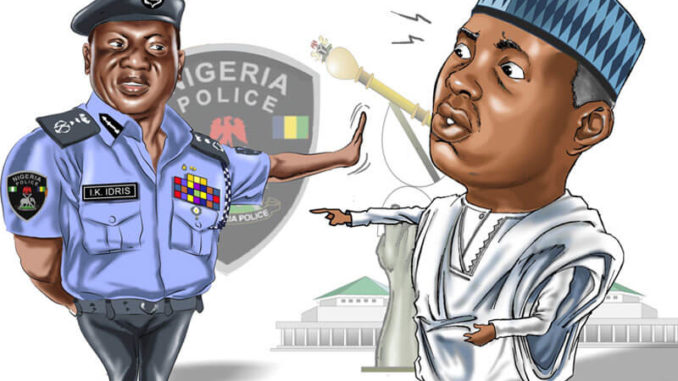
Even with the Senate excesses, Ibrahim Idris has become more dangerous to the system than many may realize
The exchange of intemperate words between the Senate and the Inspector- General of Police, Mr Ibrahim Idris over the latter’s refusal to honour their invitation was an unfortunate development. At issue is the subordination of civil authorities to critical institutions of state as well as the primacy of the rule of law in a democracy. While neither the Senate nor the IGP can claim any moral high-ground from what has transpired thus far, what particularly worries is that such infighting over matters that are not necessarily about public interest is emblematic of the current administration.
Rising from a closed-door session on Wednesday, the Senate disclosed that the conduct of the IGP in not personally honouring their invitation “amounted to a great disrespect to the legislature and to constituted authority.” It also resolved “to declare the IGP an enemy of our democracy and not fit to hold any public office within and outside Nigeria.” In an angry response, Idris accused the lawmakers of attempting to blackmail him over the trial of Senator Dino Melaye for alleged criminal matters. The Senate has also countered by saying Idris is holding on to straws and that the invitation extended to him was over the rising crime rate in the country and not about Melaye.
Meanwhile, the IGP could not be said to have ignored the Senate when he sent a team led by his deputies to represent him because he was on official assignment, the first time with the president, and the second time while attending a security meeting with military chiefs. In fact, it was the Senate that trivialised the matter when they first made their invitation about Melaye who had a case to answer with the police. Whatever may be the merit or otherwise of the case against their colleague, it would have served the Senate better if it had encouraged Melaye to report to the police as invited rather than resort to self-help.
Besides, we must make the point that this 8th Senate has also been acting in a manner that is not different from that of the IGP they are accusing of recklessness. A Senate that supports its rogue members who wilfully circumvent due process, abandons its official duties in solidarity with colleagues who have cases in court, refuses to pass the budget placed before it in over six months, and one in which its leadership seems intolerant of opposing views, cannot be said to be acting on behalf of the people.
However, while we can castigate the Senate for several infractions and glaring failings, that still does not diminish the stature of the legislative institution in the order of precedence in a representative government or does it elevate the police above that of a definitive civil force whose leadership must, at all times and in all circumstances, respect the form and content of democracy and abide by its tenets.
On the Melaye fiasco, for instance, whatever may be the case against the errant senator, in the psychological application of force to deter, the key principle is that of proportionality. Therefore, the deployment of more than a hundred policemen in combat gear along the corridors of a hospital ward where Melaye is receiving treatment makes no sense. The pertinent question is: Is Melaye now so dangerous as to deserve more armed deterrence than the sundry criminal cartels freely roaming the country, killing and maiming defenceless citizens? We do not think so.
In a democratic environment, the Inspector-General of Police must be accountable to the law, and not a law unto himself: especially when the institution such a person heads is expected to remain politically neutral and to enforce the law without bias. Again, both in the behaviour of such individual and in the organisation as a whole, there must also be a strict adherence to high standards of professional code of ethics and conduct. As matters now stand, those standards have not only been lacking under IGP Idris, the police seem to have surpassed Senator Melaye in comic indulgence to the extent of elevating their act to tragic proportions.
Quote
In a democratic environment, the Inspector-General of Police must be accountable to the law, and not a law unto himself: especially when the institution such a person heads is expected to remain politically neutral and to enforce the law without bias


Be the first to comment